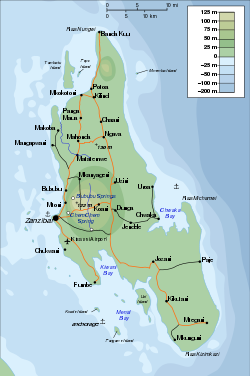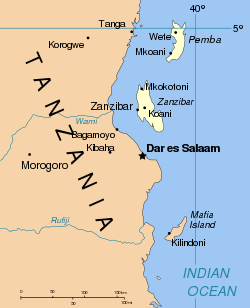Zanzibar
| Zanzibar | |||
|
|||
 |
|||
 |
|||
| Coordinates: | |||
| Country | Tanzania | ||
|---|---|---|---|
| Islands | Unguja and Pemba | ||
| Capital | Zanzibar City | ||
| Settled | AD 1000 | ||
| Government | |||
| - Type | semi-autonomous part of Tanzania | ||
| - President | Amani Abeid Karume | ||
| Area | |||
| - Total | 1,651 km² (637 sq mi) | ||
| Population (2004) | |||
| - Total | 1,070,000 | ||
Zanzibar (pronounced /ˈzænzɨbɑr/) is part of the East African republic of Tanzania. It consists of the Zanzibar Archipelago in the Indian Ocean, 25–50 km (15–30 mi) off the coast of the mainland. There are numerous small islands and two large ones: Unguja (the main island, informally referred to as "Zanzibar"), and Pemba. Zanzibar was once a separate state with a long trading history within the Arab world; it united with Tanganyika to form Tanzania in 1964, and still enjoys a high degree of autonomy within the union. The capital of Zanzibar, located on the island of Unguja, is Zanzibar City, and its old quarter, known as Stone Town, is a World Heritage Site.
Zanzibar's main industries are spices, raffia, and tourism. It is still sometimes referred to as the Spice Islands (a term also associated with the Maluku Islands in Indonesia), because of the significance of its production of cloves, of which it used to be the world leader, and also nutmeg, cinnamon and pepper. The ecology is of note for being the home of the endemic Zanzibar Red Colobus and the elusive Zanzibar Leopard. The word "Zanzibar" probably derives from the Persian زنگبار, Zangi-bar ("coast of the blacks"); ultimately from the Arabic words of the same meaning بر الزنج, however it is known in Arabic as Zanji-bar (زنجبار).
Contents |
History

The presence of microlithic tools attests to 20,000 years of human occupation of Zanzibar. The islands became part of the historical record of the wider world when Arab traders discovered them and used them as a base for voyages between Arabia, India, and Africa. Unguja offered a protected and defensible harbour, so although the archipelago offered few products of value, the Arabs settled at what became Zanzibar City (Stone Town) as a convenient point from which to trade with East African coastal towns. They established garrisons on the islands and built the first mosque in the Southern hemisphere.[1]
During the Age of Exploration, the Portuguese Empire was the first European power to gain control of Zanzibar, and kept it for nearly 200 years. In 1698, Zanzibar fell under the control of the Sultanate of Oman, which developed an economy of trade and cash crops, with a ruling Arab elite. Plantations were developed to grow spices, hence the moniker of the Spice Islands (a name also used of Dutch colony the Moluccas, now part of Indonesia). Another major trade good was ivory, the tusks of elephants killed in mainland Africa. The third pillar of the economy was slaves, giving Zanzibar an important place in the Arab slave trade, the Indian Ocean equivalent of the better-known Triangular Trade. Zanzibar City was the main trading port of the East African slave trade, with about 50,000 slaves a year passing through the city.[2] The Sultan of Zanzibar controlled a substantial portion of the East African coast, known as Zanj, which included Mombasa and Dar es Salaam, and trading routes which extended much further inland, such as to Kindu on the Congo River.
Sometimes gradually, sometimes by fits and starts, control came into the hands of the British Empire; part of the political impetus for this was the 19th century movement for the abolition of the slave trade. The relationship between Britain and the nearest relevant colonial power, Germany, was formalized by the 1890 Helgoland-Zanzibar Treaty, in which Germany pledged not to interfere with British interests in insular Zanzibar. That year, Zanzibar became a protectorate (not a colony) of Britain. From 1890 to 1913, traditional viziers were appointed to govern as puppets, switching to a system of British residents (effectively governors) from 1913 to 1963. The death of one sultan and the succession of another of whom the British did not approve led to the Anglo-Zanzibar War. On the morning of 27 August 1896, ships of the Royal Navy destroyed the Beit al Hukum Palace; a cease fire was declared 38 minutes later, and the bombardment subsequently became known as The Shortest War in History.
The islands gained independence from Britain in December 1963 as a constitutional monarchy. A month later, the bloody Zanzibar Revolution, in which thousands of Arabs and Indians were killed in a genocide and thousands more expelled,[3] established the Republic of Zanzibar and Pemba. That April, the republic merged with the mainland former colony of Tanganyika, or more accurately, was subsumed by the much larger entity. This United Republic of Tanganyika and Zanzibar was soon renamed as a portmanteau, the United Republic of Tanzania, of which Zanzibar remains a semi-autonomous region.
Fauna
Zanzibar has many animal species from the African mainland who traveled from the mainland during the last ice age. These included the Zanzibar leopard, which is critically endangered and possibly extinct.
Geography

Politics
Zanzibar has its own Revolutionary Council and House of Representatives (with 50 seats, directly elected by universal suffrage to serve five-year terms); these make up the semi-autonomous Revolutionary Government of Zanzibar. Unguja comprises three administrative regions: Zanzibar Central/South, Zanzibar North and Zanzibar Urban/West. Pemba has two: Pemba North and Pemba South.
Since the early 1990s, the politics of the archipelago have been marked by repeated clashes between two political parties, the Chama Cha Mapinduzi (CCM) and the Civic United Front (CUF). Contested elections in late 2000 led to a massacre in Zanzibar in January 2001, with the government shooting into crowds of protestors, killing 35 and injuring 600[4]. Violence erupted again in 2005 after another contested election, with the CUF again claiming its rightful victory had been stolen from them. Following 2005, negotiations between the two parties aiming at the long-term resolution of the tensions as well as a power-sharing accord took place, but suffered repeated setbacks, most notably in April 2008, when the CUF walked away from the negotiating table following a CCM call for a referendum to approve of what had been presented as a done deal on the power-sharing agreement.
Education
The island is home to Zanzibar University.
Culture
Zanzibar is a conservative, Sunni Muslim society. Its history was influenced by the Arabs, Persians, Indians, Portuguese, British and the African mainland.
Stone Town is a place of winding lanes, circular towers, carved wooden doors, raised terraces and beautiful mosques. Important architectural features are the Livingstone house, the Guliani Bridge, and the House of Wonders. The town of Kidichi features the hammam (Persian baths), built by immigrants from Shiraz, Iran during the reign of Barghash bin Said.
Zanzibar was the first region in Africa to introduce colour television, in 1973. The current TV station is called TvZ. The first television service on mainland Tanzania was not introduced until some twenty years later. In September 2006, a radical Islamic group on the archipelago, Uamsho, forced organizers to abandon plans to mark the 60th birthday of the late Freddie Mercury (born Farrokh Bulsara into the Parsi community of Stone Town, who reached fame as the lead singer of the rock group Queen), saying he violated Islam with his openly bisexual lifestyle. (See Islam and homosexuality.)
Economy
Zanzibar, mainly Pemba Island, was once the world's leading clove producer, but annual clove sales have since plummeted by 80% since the 1970s. Explanations given for this is a fast-moving global market, international competition and a hangover from Tanzania’s failed experiment with socialism in the 1960s and ’70s, when the government controlled clove prices and exports. Zanzibar now ranks a distant third with Indonesia supplying 75% of the world's cloves, compared to Zanzibar's 7%.[5]
Zanzibar exports spices, seaweed and fine raffia. It also has a large fishing and dugout canoe production. Tourism is a major foreign currency earner.
During May and June 2008 Zanzibar suffered a major failure of its electricity system which left the island without mains electricity for nearly a month (May 21 - June 19) and entirely dependent on alternative methods of electricity generation (mainly diesel generators). This led to a serious and ongoing shock to the island's fragile economy (mainly based on international tourism).
Famous people
Freddie Mercury of the popular band Queen was born in Zanzibar.
Picture gallery
See also
- German East Africa
- Heligoland-Zanzibar Treaty
References
- ↑ Else, David. Guide to Zanzibar. ISBN 1 898323 28 3.
- ↑ Swahili Coast
- ↑ Yeager, Rodger (1989). Tanzania: An African Experiment. pp. 27.
- ↑ Human Rights Watch report
- ↑ "Zanzibar Loses Some of Its Spice, Los Angeles Times".
Further reading
- Revolution in Zanzibar, Don Petterson (Boulder, Colorado: Westview Press, 2002)
- Memoirs of an Arabian Princess from Zanzibar, Emily Ruete, 1888. (Many reprints). Author (1844-1924) was born Princess Salme of Zanzibar and Oman and was a daughter of Sayyid Said.
- Banani: the Transition from Slavery to Freedom in Zanzibar and Pemba, H. S. Newman, (London, 1898)
- Travels in the Coastlands of British East Africa, W. W. A. FitzGerald, (London, 1898)
- Zanzibar in Contemporary Times, R. N. Lyne, (London, 1905)
- Pemba: The Spice Island of Zanzibar, J. E. E. Craster, (London, 1913)
- Nyerere and Africa: End of an Era, and Tanzania under Mwalimu Nyerere: Reflections on an African Statesman, Godfrey Mwakikagile, (Pretoria, South Africa: New Africa Press, 2006)
- Hatice Uğur, Osmanlı Afrikası'nda Bir Sultanlık: Zengibar (Zanzibar as a Sultanate in the Ottoman Africa), İstanbul: Küre Yayınları, 2005. http://www.kureyayinlari.com/Icindekiler.aspx?KID=23. For its English version, see http://seyhan.library.boun.edu.tr:80/record=b1268198
- Challenges of Informal Urbanisation. The Case of Zanzibar/Tanzania, Wolfgang Scholz (Dortmund 2008)
External links
- Zanzibar travel guide from Wikitravel
- History and places of Zanzibar
- Government of Zanzibar
- Map of Zanzibar and Tanganyika in 1886
- BBC article about new flag adoption
- Zanzibar climate, visa and medical advice
- Zanzibar climate, visa and medical advice
- Zanzibar, The Columbia Encyclopedia
- Zanzibar without Poverty - A plain language guide to the Revolutionary Government of Zanzibar’s Zanzibar Poverty Reduction Plan (ZPRP) of January 2002
- Zanzibar Network for Responsible Tourism - NGO Umoja
- Map of Zanzibar
|
|||||
|
|||||
